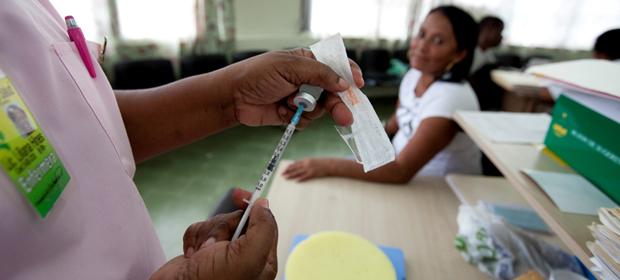Where We Work
See our interactive map


Striking students are blocking the road to Colón, a city of 200,000 on the Caribbean side of Panama. Cars and trucks are at a standstill in the steamy morning heat. We take turns leaving the car to pop into a gas station bathroom. Traffic begins to move when two of us are just returning, prompting a mad sprint on foot through multiple lanes to catch up to the car and jump in. Arriving late at Manuel Amador Guerrero Hospital, we’re a bit sweaty and flustered. But Nurse Liliana Hines is the picture of serenity.
Wearing pink scrubs and glasses, she shows the visitors around. Moving gracefully through the bustling spaces, Hines interacts with colleagues, checks on patients, and describes the recent improvements in the staff’s approach to HIV treatment and care.
Through projects funded by USAID, IntraHealth International is helping Panama and other Central American countries to improve their decentralized HIV services. Many hospitals struggle with issues such as infection prevention, nutritional care, and discriminatory practices.
Some changes have been small but meaningful. Hines explains that staff used yellow sheets for patients with HIV. “[The patients] feel that they have been secluded from the others, because anyone that will come to the hospital, they see that you have a yellow sheet on your bed, they know definitely that you have HIV.” This was one of many issues that she and a multidisciplinary team addressed; now all beds have the same color sheets.
Back in the car at lunchtime with Hines, we head to the Marriott to pick up our photographer. A shrieking police car and an ambulance come up fast behind us. Hines mentions they’re going to the Marriott too, where a shootout has left a man dead. She just heard it on the radio. We continue with trepidation, but Hines relaxes us by chatting about the city and her own life.
Finding our photographer alive, we drive through a heavy downpour to a small restaurant Hines likes. A heavenly dish of the freshest grilled shrimp with garlic and coconut rice prompts rapturous praise. Hines describes the steps for making the rice at home, which will prove to be a wonderful gift.
Taking more time out of her day, Hines brings the photographer to the apartment of a couple living with HIV. Their rapport with her is evident. Back at the hospital, she gives an interview in excellent English to help out her Spanish-challenged visitors.
Our trip will go on to include other sites in Panama as well as El Salvador and Guatemala. One particular image lingers from that first day in Colón: Hines spends time in conversation with a thin male patient, thoughtfully answering his questions. Satisfied, the man’s radiant smile pays tribute to Liliana Hines’ special gifts.
Meet them in this two-minute video.
To learn more, read Bridging the Gaps: Improving Decentralized HIV Services in Panama and Supporting Health Worker Performance with Effective Supervision.



